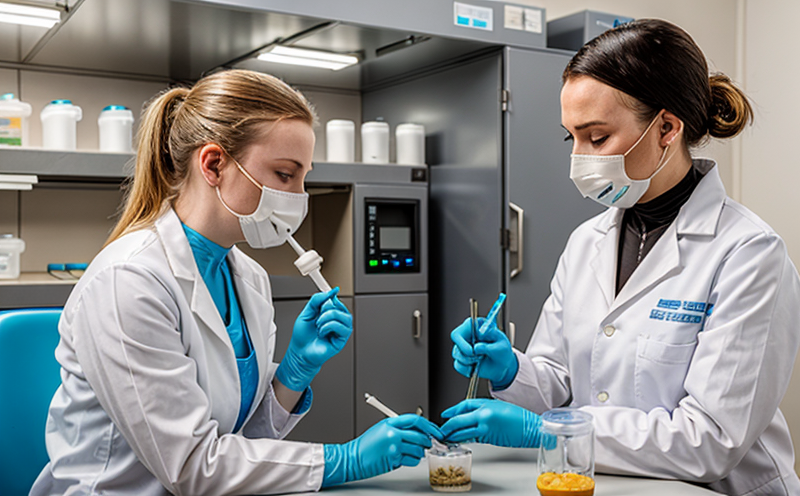EN 20790 Multi-Mycotoxin Analysis in Herbal Teas
The European standard EN 20790 provides a comprehensive framework for the determination of multiple mycotoxins in food and feed products, including herbal teas. This analysis is crucial for ensuring the safety and quality of herbal tea products by identifying harmful fungal metabolites that can contaminate plant-based materials during cultivation, processing, or storage.
Our laboratory adheres to this standard to deliver accurate, reliable, and repeatable test results. The scope includes the detection of a wide range of mycotoxins such as aflatoxins (AFB1, AFG1), ochratoxin A, zearalenone, trichothecenes, and others that are known to be present in herbal tea ingredients.
The process begins with the careful selection of representative samples from various batches and lots. Samples undergo initial inspection for visible contamination or quality issues before being processed according to EN 20790 guidelines. This includes grinding, homogenization, and extraction using appropriate solvents followed by cleanup steps if necessary.
Instrumentation used in this analysis typically involves liquid chromatography-tandem mass spectrometry (LC-MS/MS), which offers high sensitivity and selectivity needed for detecting trace amounts of mycotoxins. The method follows stringent calibration procedures to ensure precision and accuracy throughout the analytical process.
The results are reported according to EN 20790 requirements, providing quantifiable data on the presence and levels of identified mycotoxins within specified limits set by relevant regulatory authorities like the European Commission. Compliance with these standards helps manufacturers meet international safety standards while protecting consumers from potential health risks associated with mycotoxin consumption.
In summary, our EN 20790 multi-mycotoxin analysis service ensures that herbal tea products are free from harmful contaminants and meet stringent quality control benchmarks. This not only enhances consumer confidence but also supports brand reputation and regulatory compliance for companies operating in this sector.
Applied Standards
- EN 20790: European standard for the determination of multiple mycotoxins in food and feed products, including herbal teas.
- ISO/TS 15343-3:2015: Guidelines for sampling and preparation methods for laboratory analysis of foods; part 3: Herbal teas.
The application of these standards ensures consistent, accurate, and reliable results that comply with international regulations and industry best practices. Compliance with EN 20790 specifically addresses the unique challenges associated with analyzing mycotoxins in complex botanical matrices like those found in herbal teas.
Benefits
- Compliance Assurance: Ensures adherence to European Union regulations regarding food safety and quality standards.
- Risk Mitigation: Identifies potential contamination early, minimizing the risk of product recalls or legal action.
- Customer Confidence: Provides transparency about the purity and safety of herbal tea products, enhancing consumer trust.
Quality and Reliability Assurance
Our commitment to quality extends beyond mere compliance with EN 20790. We invest in state-of-the-art equipment and continuously train our staff on the latest methodologies. Rigorous internal audits and external certifications further reinforce our reputation for delivering high-quality services.
We employ experienced scientists who specialize in mycotoxin analysis, ensuring that every sample receives expert attention. Our quality management system is ISO/IEC 17025 accredited, guaranteeing unbiased test results based on robust protocols and methodologies.
By choosing our EN 20790 multi-mycotoxin analysis service, you can rest assured knowing that your herbal tea products will be rigorously tested to meet the highest standards of safety and quality. This not only protects your brand but also contributes positively towards public health initiatives aimed at reducing mycotoxin exposure.





